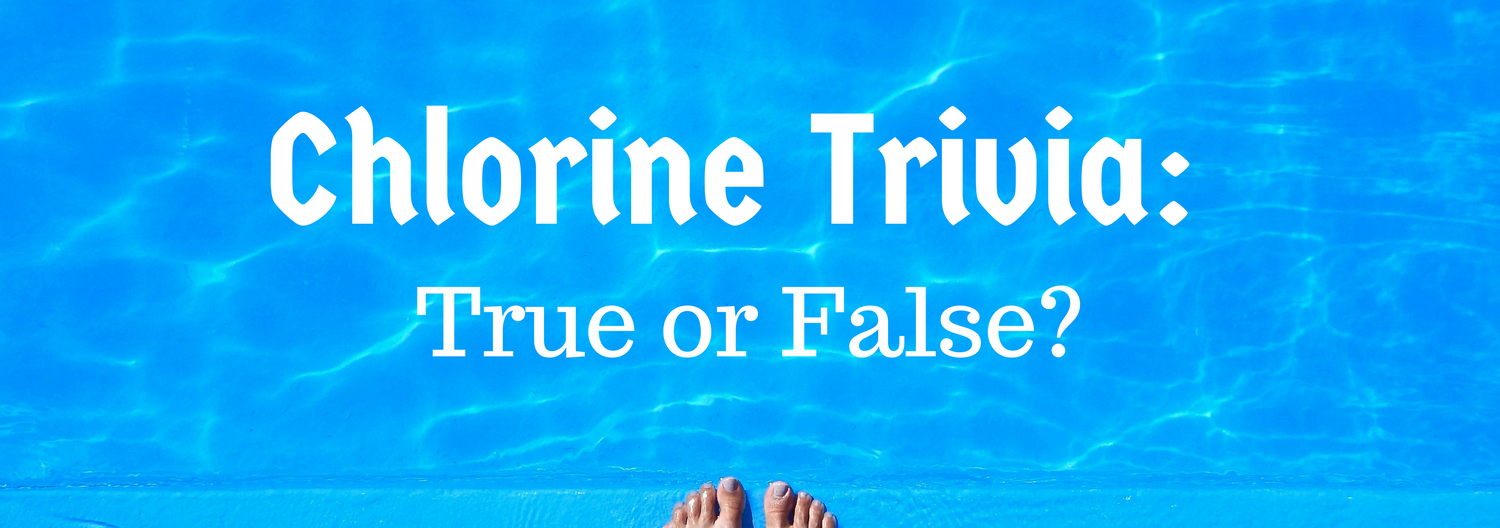Chlorine.
Every swimmer is intimately aware of it.
Even casual pool goers can’t miss it. No one enjoys the smell or what it does to their skin and hair. Not to mention the destruction it wreaks on swimsuits.

Yet despite this, almost every pool contains chlorine. Why is this, and what’s the truth behind chlorine?
Back to Basics

Harkening back to High School chemistry class, you might remember that chlorine (Cl) is the 17th element on the Periodic Table of Elements. Chlorine’s common form is a yellow-green colored gas. That’s actually where its name comes from- the Greek word for yellow-green is chloros.
But because it combines well with most elements, it is rarely found in its pure form in nature. Its most common combination is Sodium Chloride- table salt.
In industry, chlorine is often found in bleach because of its sanitation properties. This is also the reason a small amount is used in almost all drinking water.
And of course it is used for sanitation reasons in swimming pools.
Chlorine and You
So how does chlorine actually affect you in the pool? Surprisingly, there are many common misconceptions about chlorine:
#1- A strong chlorine smell means there’s A LOT of chlorine in the water.
This is NOT TRUE. Chlorine is used to sanitize pools because when a contaminate enters the pool- dirt, oil, sunscreen, makeup- the chlorine attaches and reacts with it. When this reaction happens, it creates chloramines. Chloramines are what smell strongly of chlorine.
Basically, the more dirt and contaminates in a pool, the more the chlorine reacts and the stronger the chlorine smell. So a strong smelling pool probably actually needs more chlorine added to it.
#2- Chlorine in the water is what irritates swimmers’ eyes.
This is SORT OF true. Those chloramines I mentioned? Those are what irritate eyes. Like previously mentioned, chloramines are created when the chlorine in the water reacts with contaminates. The dirtier the pool, the more chloramines are created.
The more chloramines, the more the water will irritate eyes.
#3- If the pool is dirty, it’s the chlorine/pool technician’s fault.
While it’s always nice to think it’s someone else’s job, chlorine can’t do it all. If you hadn’t noticed, the list of common contaminates all come from humans. While the pool technicians do their best to keep pools as clean as possible, swimmers can help a lot too.
The biggest thing that would help in swimming pool sanitation is if everyone was to take a shower BEFORE getting in the pool. This would greatly help to minimize the number of contaminates entering the pool.
Then, fewer chloramines would be created and everyone would be happier.
Cautions
While the type of chlorine people come across on a daily basis is practically harmless, there are some cautions to be aware of.
Inhaling large amounts of chlorine in its gaseous form can be fatal. Pools can create a very small amount of chlorine gas (so small it is naturally dispersed in outdoor pools), and indoor pools work very hard to make sure they are well ventilated.
While chlorine is a fast acting sanitizer, there are some things that it does not kill immediately. You should still practice normal precautions to prevent sickness.
These things are rare though, and authorities have still found chlorine to be the best sanitizing option due to its effectiveness and low cost.
Your Turn
Have any fun facts about chlorine?
What’s your worst chlorine experience?
Are you a swimmer that loves the smell of chlorine?



Leave a comment
All comments are moderated before being published.
This site is protected by hCaptcha and the hCaptcha Privacy Policy and Terms of Service apply.